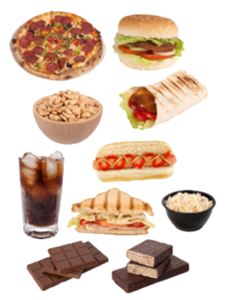Throughout my life, I’ve struggled to maintain my weight within the normal range for my height. I’ve been on many, many diets. I’ll reach my goal weight and then allow 15-20 pounds to creep back on due to a lapse in healthy eating habits. I’ve gotten really frustrated with myself and wondered why I couldn’t exercise the kind of discipline in this area of my life that serves me so well in others.
A good friend put me on to a collection of books that helped me understand why weight management has proven troublesome for so many of us. (Check out the bibliography at the end of this blog post.) Here’s my understanding of the biological mechanisms that are in play:
- When we eat foods that are consistent with our body’s fundamental design, the sensory receptors in our brains tell us when we have eaten enough and shut our appetites down.
- Sugar and fat interferes with this mechanism. They stimulate the pleasure centers of our brains in ways that mirror addictive drugs. The drive for reward overrides signals that the body has had enough food.
- Chronic exposure to highly palatable food rewires our brains and compels us to seek its rewards. Over time, we need to increase the quantities of sugar and fat that we consume to get the desired pleasure.
- In addition to physiological cravings, we’re triggered by food-related emotional cues which contribute to unhealthy eating habits that are very difficult to break.
Not surprisingly, food manufacturers know all about these dynamics. Their profit motive combined with an intensely competitive marketplace drive them to exploit our culinary weakness and get us to buy as much of their products as possible. They employ highly trained scientists who determine the precise amounts of sugar, fat, and salt that will make their offerings irresistible. They also spend large sums of money on advertising to work on our emotional triggers and build brand loyalty.
Here are a few startling facts regarding the American diet from the book Salt, Sugar, Fat:
- Two-thirds of our diet comes from processed foods. In the relentless battle for shelf space, food manufacturers launch 14,000 new offerings annually. Salt, sugar, and fat boost allure; salt extends shelf life.
- We’re hooked on sugar. The average American takes in the equivalent of 22 teaspoons of sweetener each day.
- The average American eats 33 pounds of cheese per year, triple what we ate in 1970. This level translates to 60,000 calories and 3,100 grams of saturated fat.
- According to a 1991 study, three-quarters of our daily salt consumption is embedded in the processed foods we eat. High salt intake increases the risk for hypertension, a condition that afflicts 1 in 4 Americans.
- Every 4 years since 1986, study participants exercised less, watched more TV, and gained 3.35 pounds.
Food engineering, marketing, and emotional triggering all contribute to this unfortunate state of affairs. We’re also driven powerfully by convenience. With congested schedules and a substantive uptick in daily screen time, we avoid kitchen duties like the plague. According to a 2011 study by the Organisation for Economic Co-operation and Development (OECD), we spend only 30 minutes per day cooking, the lowest among the 34 OECD members. We’re third lowest in the time spent eating (1 hour 14 minutes daily), and we have the highest obesity rate.
Armed with this information, I’m able to treat my culinary transgressions with far more compassion. I understand why I have a weakness for certain foods and why it’s so easy to overindulge. I also know that I can’t keep them around the house and need to put some distance between myself and temptation when in social situations.
The good news is that it’s possible to put a stop to the cravings. When I remain faithful to our whole foods plant based diet, I don’t miss all of the fattening treats that I used to relish. I’m satisfied by the delicious meals that we prepare. Yes, it takes more time to pursue this path. But it’s easy enough to pair kitchen duties with screen time or stimulating conversation with my husband (a.k.a. the sous-chef).
Breaking the Food Seduction: The Hidden Reasons Behind Food Cravings by Neal Barnard, MD, ©2003
The End of Overeating: Taking Control of the Insatiable American Appetite, by David Kessler, MD, ©2009
Salt, Sugar, Fat: How the Food Giants Hooked Us by Michael Moss, ©2013
In Defense of Food: An Eater’s Manifesto by Michael Pollan, ©2008
The Pleasure Trap: Mastering the Hidden Force that Undermines Health and Happiness by Douglas J. Lisle and Alan Goldhamer, ©2003
